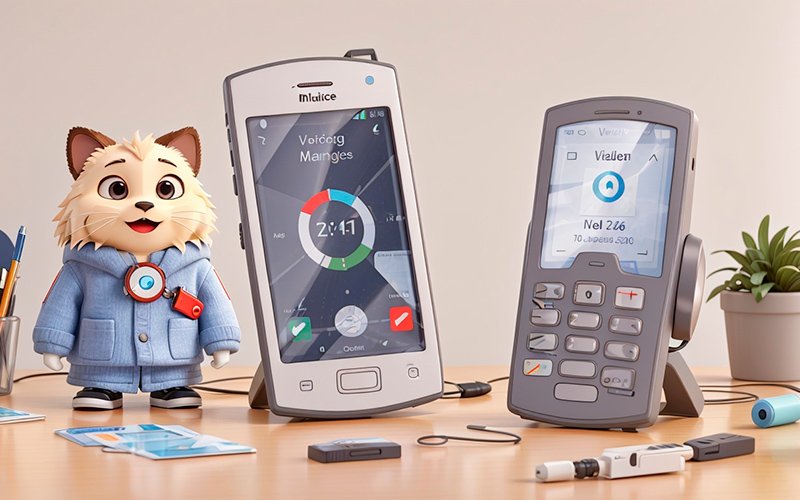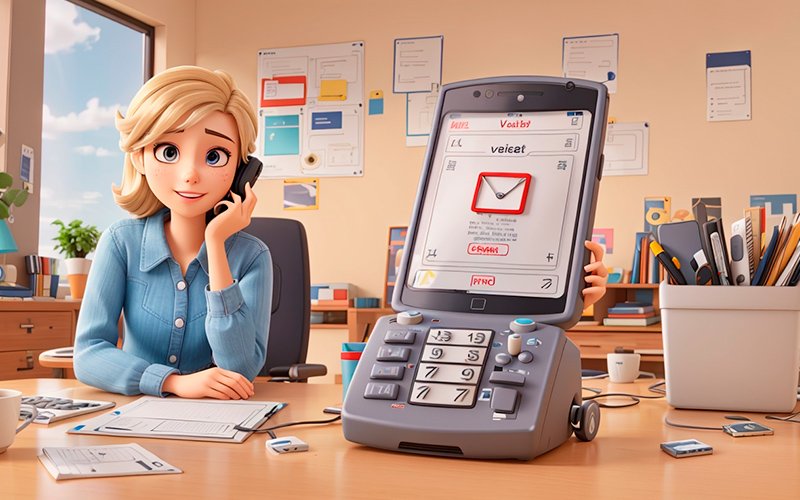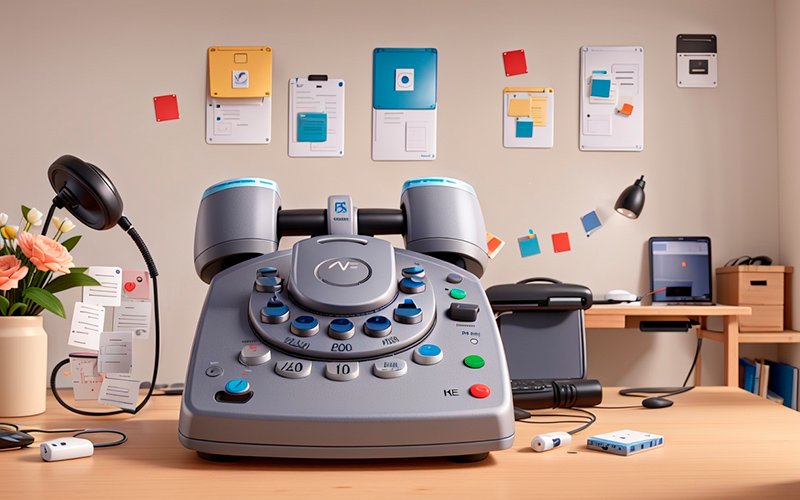
Voicemail messages have stood the test of time, persisting as a communication tool despite the rise of text-based alternatives. While they may not be as instant as a text or chat message, they offer a unique way to convey thoughts, emotions, and information.
In a world that seems to be moving at the speed of light, voicemail messages serve as a reminder of a slower, more personal form of communication. They give individuals the opportunity to connect on a deeper level, using their voices to convey warmth, empathy, and sincerity. Unlike the brevity of a text message, voicemails allow for a fuller expression of emotions, which is especially important in personal relationships.
In the professional sphere, voicemail messages still play a crucial role. They provide a platform for clear and detailed communication, ensuring that important information isn’t lost in translation. Additionally, voicemail messages create a sense of accountability, when you leave a voicemail, there’s a record of your message, making it easier to track conversations and follow up as needed.
Why Voicemail Still Matters

In an age where digital communication is the norm, voicemail adds a personal touch to your messages. The sound of a familiar voice can be reassuring and create a deeper connection. It’s the auditory equivalent of a handwritten letter in a world dominated by emails and text messages.
Voicemail messages can be a lifeline in situations where the written word falls short. Imagine a loved one receiving a heartfelt voicemail during a difficult time. The empathy in your voice can provide comfort that words on a screen cannot replicate. Likewise, in business, a well-crafted voicemail can convey sincerity and dedication in a way that a hurried email cannot.
Crafting a Captivating Voicemail Message

A captivating voicemail message is an art form that combines brevity with impact. In the digital age, attention spans are shorter than ever, so your message must grab the listener’s attention from the start.
- The Art of a Strong Opening. Begin your voicemail with a friendly and engaging greeting. Use the recipient’s name if possible, as this immediately personalizes the message. Follow this with a brief but clear introduction of yourself and the purpose of your call.
- Concise and Clear Communication. The essence of an effective voicemail lies in its brevity and clarity. Avoid rambling or going off-topic. Respect the recipient’s time by getting to the point quickly. Outline the key information you need to convey and stick to it.
- Adding a Personal Touch. To make your voicemail memorable, add a personal touch that shows you value the relationship. Mention something specific to your connection or recent interactions. This not only strengthens your message but also deepens your connection with the recipient.
Navigating Professional Voicemail Etiquette

While voicemails are more personal than emails, they still demand professionalism, especially in a business context.
- Setting a Professional Tone. When leaving voicemails for professional contacts, maintain a tone that reflects your seriousness and competence. Even though you’re using your voice, it’s still a formal interaction.
- Leave a Call-Back Number. Always begin and end your message by clearly stating your contact number. Ensure it’s easy to write down or remember. This simple act can save time and frustration for the recipient.
- Time Sensitivity. Respect the recipient’s time by clearly conveying the urgency of the matter if applicable. If it’s not urgent, make that clear too. This helps the recipient prioritize their responses effectively.
Voicemail Messages in the Digital Age

Voicemail messages have adapted to the digital age, making them more accessible and versatile than ever.
- Transcribing Voicemail Messages. Many services now offer automatic transcription of voicemail messages, making them more accessible to individuals who prefer reading to listening. This feature also facilitates easy storage and retrieval of information contained in voicemails.
- Managing Voicemail in Your Inbox. Integrating voicemail into your email inbox streamlines communication. You can access and organize your voicemails alongside your emails, ensuring nothing gets overlooked.
The Importance of a Good Voicemail Greeting

Your voicemail greeting is the first impression callers receive, so make it count.
- Warm and Welcoming. Craft a warm and welcoming voicemail greeting that sets a positive tone for the conversation. Use a friendly and approachable tone, making callers feel comfortable and valued.
- Brief and to the Point. Keep your greeting concise. Avoid lengthy introductions or excessive background information. Get to the point quickly, so callers know they’ve reached the right person or number.
Voicemail Messages in Business
In the business world, voicemail messages serve a dual purpose: they convey professionalism and provide a record of communication.
- Leaving an Impression. Your voicemail message can leave a lasting impression on potential clients or business partners. A well-crafted message reflects your commitment to communication and can set you apart from competitors.
- Handling Missed Business Calls. Voicemail ensures you don’t miss important business calls, even when you’re unavailable. This reliability is critical for maintaining seamless communication in a professional setting.
- Keeping Records. Voicemail messages provide a valuable record of business communications. This can be essential for legal and compliance purposes, as well as for maintaining a clear trail of important conversations.
Voicemail Messages in Personal Life
In personal relationships, voicemail messages have the power to convey emotions and nuances that text messages often lack.
- Connecting Emotionally. Hearing the sincerity in someone’s voice when they leave a voicemail can strengthen personal connections. It’s a tangible reminder of the emotional bonds we share with others.
- Conveying Urgency. In personal matters, voicemail can effectively convey the urgency of a situation. When words are not enough, the tone of your voice can express the seriousness of the matter.
The Future of Voicemail Messages

As technology continues to advance, the future of voicemail messages looks promising, with enhancements and integration on the horizon.
- Integration with AI. Artificial intelligence is being integrated into voicemail systems, making them smarter and more efficient. AI can help transcribe messages, prioritize calls, and even suggest responses based on the message content.
- Enhanced Security. Security is a growing concern in the digital age. Voicemail systems are evolving to include enhanced security measures, safeguarding messages from unauthorized access and ensuring the privacy of sensitive information.
Common Misconceptions About Voicemail Messages

Let’s dispel some common myths surrounding voicemail.
- Voicemail is Obsolete. Contrary to belief, voicemail remains a relevant and valuable communication tool. Its adaptability and unique advantages ensure it continues to serve a vital role in our connected world.
- No One Listens to Voicemail Anymore. It’s a misconception that no one listens to voicemail messages. Many people still value and rely on voicemail as a means of communication, especially in situations where emotional nuance and detailed information are crucial.
Conclusion: Your Voice Matters
In a world filled with digital messages, voicemail still holds a unique place in communication. Your voice, your message, and your emotions matter. Embrace the power of voicemail to connect more deeply with others, whether in your personal life or in the professional realm.
Frequently Asked Questions (FAQs)
To engage your recipient, address them by name, use a friendly tone, and get to the point quickly. Share relevant information and express your willingness to assist. Voicemail security is a priority. Ensure your voicemail PIN or password is strong to protect your messages from unauthorized access. Consider using biometric authentication where available for added security. Aim to keep your voicemail concise, ideally under a minute. Respect the recipient’s time, as overly long messages can deter them from listening to the entire voicemail. Yes, many voicemail services offer automatic transcription, which can be highly beneficial for individuals who prefer reading or need to keep written records of their messages. Businesses can benefit in various ways, such as ensuring they don’t miss crucial calls, providing excellent customer service, and maintaining a clear record of communications for compliance and reference purposes. Additionally, voicemail messages can convey a professional image and enhance client relationships.How can I make my voicemail message more engaging?
Are there any security concerns with voicemail messages?
What is the ideal length for a voicemail message?
Can voicemail messages be transcribed automatically?
How can businesses benefit from using voicemail messages?